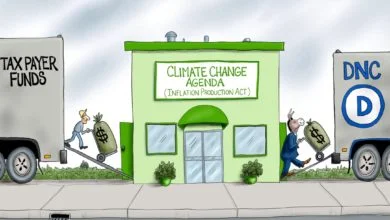Positive economic news masks worsening crisis
Positive economic numbers touted this week conceal the inevitable crisis soon to strike the United States. Indicators like unemployment, job creation, and stock market valuations are showing signs of recovery, according to many experts. Official unemployment numbers are down, stocks are up, and more jobs have been created in recent months than predicted. Plus, some financial analysts are claiming that US markets are less exposed to Europe than previously thought, meaning the mess in Greece soon to be the mess in Italy, Spain, Portugal and eventually the rest of the euro zone, will have much less of an effect on the US economy than feared.
On the surface, this may appear to be good news, but America’s economy remains in terrible shape, plagued mainly by enormous debt that no one – neither Republicans nor Democrats – are prepared to deal with, yet. So what?
Whenever the debt issue is mentioned people react in one of two ways: they either grimace in pain, knowing financial calamity will befall us sooner or later, or they blithely dismiss it as a non-issue, attacking those who fear the worst as ignorant reactionaries unfamiliar with central banking or macro-economics. So what is the truth, which view is correct?
The truth is that debt matters, and has throughout history. Just ask the Greeks right now. Or ask the Argentinians and Mexicans, countries that defaulted within the last 20 years. To find examples of default we don’t even need to look beyond American borders. This past decade alone cities like Harrisonburg, PA and Vallejo, CA have declared bankruptcy, and yet another California city Stockman, is on the verge of bankruptcy as we speak. Even Orange County, CA defaulted, though that happened almost twenty years ago in 1994.
Of course, many of these defaults like the bankruptcies on Wall Street can be quickly salvaged by higher level government support. As long as some level of government can come to the rescue and infuse credit where it is lacking, perhaps things will be ok. Unfortunately, going forward this is less and less of an option. After years of overspending, whether for pensions, union contracts, healthcare, or to combat the recession, America is systemically in debt. Basically, every level of American government and society is in the red.
The mountain of debt piling up in Washington is only part of the story. Everyone knows that the federal government has amassed trillion dollar debts, and is on the hook for tens of trillions more in unfunded liabilities. But the real crisis is at the state, local, and private levels. States are in bad financial shape, strained by rising pension and operating costs coupled with falling revenues. Municipal finances may be the worst. Municipal debt has doubled over the last ten years, which means cities and towns are facing huge cutbacks state governments will be unable to cover.
Then there is consumer debt. Consumer debt is nothing short of gigantic. Since the 1980s US wages have been relatively stagnant, so families across America financed higher standards of living by going into debt, using credit cards or taking out loans. It is hard to estimate the exact amount of consumer debt but some studies report numbers as high as 100 trillion and some say higher. Again, this means that consumers have to save not spend to deleverage, and standards of living will drop as a result, probably for a decade, if not longer.
So if debt matters, and America’s debt is so huge, why hasn’t there been a crisis yet? Part of the answer, ironically, is debt. The only reason America has not fallen into a deep depression is because the US government and to a lesser extent states and municipalities continue to find markets for their bonds, enabling them to continue borrowing. To support this effort the FED has maintained extremely low interest rates, keeping credit cheap. So America’s sluggish economy continues to crawl forward, using debt to finance its debt.
Nevertheless, taking out more debt to finance debt only increases the amount of debt. This is a game that always ends badly. At the moment, let’s refer to the end game as the “Keynesian endpoint,” the point at which America’s revenue will be entirely devoted to paying down debt service (making interest payments), sending investors running for the hills. This idea has been coined by Kyle Bass, a hedge fund manager famous for seeing the subprime mortgage crisis ahead of time and betting accordingly. His sober analysis leads him to conclude that Americans should invest in “Guns and Gold.”
This may sound ridiculous, but it isn’t. There is a massive debt crisis coming, one that has only been worsened by more government spending and the FED’s easy credit monetary policy. Be prepared for a situation worse than Greece. America’s dependency is at an all-time high. According to a recent Heritage Foundation report welfare rolls, public housing assistance, healthcare and retirement, and overall spending on dependency programs accounts for 70% of Federal spending. Meanwhile, states and cities are laying-off government workers, cutting back on police, and reducing basic services. And millions of people are out of work, in debt, or both, making them particularly vulnerable when the crash comes.
To be blunt, America is headed for tough times ahead, something that can no longer be averted, only softened or worsened. The silver lining might be that default leads to recovery, however difficult. But the longer Washington and FED Chairman Bernanke delay the deleveraging process to preserve the status quo, the more painful the recovery period will be.
Cameron Macgregor is a former naval officer and USNA graduate. He is writing his first book, America Resurrected.






Excellent truth-telling here Cameron. I especially like this line: “Basically, every level of American government and society is in the red.”
Truer words have rarely been spoken. One addition to your information here , IMO, would be the Feds printing of endless money, also known as quantitative easing, or QE1 and QE2. The end result od those irresponsible actions will be hyper-inflation. It is already here in the form of fuel prices and at the grocery store.
I would like to provide one good example of this, one that is really not being spoken about enough: Yesterday I purchased Ground Chuck (85% lean ground beef) at a whopping 3.69 a pound here in Florida.
( on sale) I thought what is going on here or am I just imagining that I had bought it for 1.69 less than two years ago. Low and behold, I found an old receipt and sure enough it was $1.69 a pound during the summer of 2010. The media covers this up in many nasty ways, (along with the government who says there is little to no inflation today) some “reporters” love to say beef is up only 13% this year. The key word would be since when? The beginning of THIS YEAR? That’s only two months.Now if they told people that beef is up a whopping 120% since 2010, maybe they would start paying attention to inflation and the truth.
Truth-telling is making a comeback in America. Will it be in time to wake up the people as to what has really transpired under Barack Obama and his fake democrats? Time will tell.That time will come on Nov. 6th 2012, when people will either vote him out of office or suffer serious consequences.